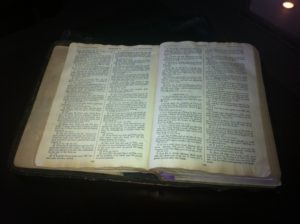 I had to get out of the office so I could focus on my class preparation. There were too many distractions and too many people dropping by, but when I settled down in the diner with my hot cup of coffee and my laptop, a young girl in the booth next to me asked, “What are you reading?” I took a deep breath, smiled and answered, “The Bible.”
I had to get out of the office so I could focus on my class preparation. There were too many distractions and too many people dropping by, but when I settled down in the diner with my hot cup of coffee and my laptop, a young girl in the booth next to me asked, “What are you reading?” I took a deep breath, smiled and answered, “The Bible.”
“Oh, that old book,” she replied. “My grandmother left me her Bible when she died, but I just couldn’t get into it.”
“Did it sound a bit like Shakespeare?” I asked.
“Yeagh,” she smiled. “I guess it did. I just don’t understand what all the fuss is about. Why should I bother reading the Bible anyway?”
“Was it important to your granny? I asked.
“Yes. She read it all the time. Kept it next to her bed in the home,” she answered.
I put down my coffee and looked at her. “It’s a curious book.” I closed my Bible so we could read the cover. “Do you see it’s full name?” I asked. “It’s called the ‘Holy’ Bible because the word ‘Holy” means ‘special.’ It’s a unique book, unlike any other.” She picked up her coffee and came over to my booth and we began to talk. “Let me see if I can give you some reasons to pick your Bible up again,” I said.
“The Bible is a very old book. In fact, some of the oldest parts of the Bible were written over 3,500 years ago and the most recent parts were written nearly 2,000 years ago. The fact that it has survived at all is amazing. It was originally written on perishable material like cured animal skins and a fragile material made from plants called “papyrus.” Many ancient books have perished through benign neglect, but the Bible has even survived determined efforts to destroy it!”
“There are a lot of really old books though aren’t there?” she asked.
“That’s true, but the Bible is different. For example, it doesn’t reflect the common errors of its day,” I answered. “Think about it. Egyptian medical books from the time of Moses prescribe animal feces, crocodile teeth, and other similar remedies for disease.”
“If men had written the Bible from their own unaided wisdom, the same silly ideas we find in other ancient books which treat scientific matters would be found in it. How shall we explain their absence in Scripture?” — Rubel Shelly.
She stopped for a minute to think. “So the Bible doesn’t do that?” she asked. Then she took a sip of her coffee and continued. “But I’ve always heard that the Bible contains a bunch of errors. In fact, I’ve heard it is filled with mistakes.”
Now it was my turn to sip my coffee. “The ‘errors’ of the Bible are a slippery lot. The list keeps changing! Relevant research by historians, archaeologists, and scientists have always settled every dispute. For example, before the 20th century, scholars thought the book of Acts was full of mistakes. Let’s look at just one. Luke, the author of Acts, called the rulers of the city of Thessalonica in Greece ‘politarchs.’ Scholars said that was an obvious ‘mistake’ since not a single inscription could be produced using this term. Today we can point to nearly 70 inscriptions that use it and over 40 percent of those are from Thessalonica itself!”[1]
“Yes, but I’ve heard that the Bible has been changed through the centuries. Couldn’t people just have edited out embarrassing stuff?”
“A lot of people think that,” I said. “Some people believe the church changed the wording. Others think books were added to it and still others believe things were taken out. What do you think?”
She rolled her eyes. “Well, a lot can happen over 4,000 years!”
“William Shakespeare wrote 400 years ago. How can you be sure the Romeo and Juliet we are reading is the same as the one he wrote?” I asked.
“Can’t we just look at his first manuscript?” she asked.
“We don’t have it,” I answered.
Of Shakespeare’s plays, for example, no manuscript in his autograph is known, and much the same is true of the productions of the other playwrights who worked in the great period of drama from 1580 to 1642. …. The facts can be summarized in this way: no play by a professional playwright which was successful on the stage and which was printed before 1642 is known to have come down to our time or near it.[2]
I continued. “So what scholars do is gather up as many copies as they can find from ancient times and compare them. The more copies we have, the more certainty we have about the veracity of a reading.”
“Well that makes sense I suppose.” The waitress refilled our cups.
“With the risk of boring you,” I apologized, “let me share some statistics with you. You’ve heard of Julius Caesar?” I asked.
“Roman Emperor,” she answered.
“A Plus! The Emperor is famous for his book the Gallic War (composed between 58 and 50 B.C.). There several manuscripts of it, but only nine or ten are good, and the oldest is some 900 years later than Caesar’s day.”
“Okay,” she replied.
“The same is true of most ancient books. There are only a handful of copies and most of those are dated hundreds of years after they were originally written.”
Of the 142 books of the Roman History of Livy (59 BC-AD 17) only thirty-five survive; these are known to us from not more than twenty MSS of any consequence, only one of which, and that containing fragments of Books iii-vi, is as old as the fourth century. Of the fourteen books of the Histories of Tacitus (c. AD 100) only four and a half survive; of the sixteen books of his Annals, ten survive in full and two in part. The text of these extant portions of has two great historical works depends entirely on two MSS, one of the ninth century and one of the eleventh. The extant MSS of his minor works (Dialogue dc Oratoribus, Agricola, Germania) all descend from a codex of the tenth century The History of Thucydides (c. 460-400 BC) is known to us from eight MSS, the earliest belonging to c. AD 900, and a few papyrus scraps, belonging to about the beginning of the Christian era. The same is true of the History of Herodotus (c. 488-428 BC). Yet no classical scholar would listen to an argument that the authenticity of Herodotus or Thucydides is in doubt because the earliest MSS of their works which are of any use to us are over 1,300 years later than the originals. — F.F. Bruce, The New Testament Documents: Are They Reliable?
“Now let’s look at the New Testament written about 2,000 years ago. There are over 5,000 ancient Greek manuscripts and over 20,000 ancient translations so we’re pretty sure we know what it originally said.”
“Okay, okay,” she said moving towards the outside edge of the booth.
“Wait,” I pleaded. “Before you go, let me give you two suggestions that will help you read it and three good reasons why you should.”
“This is beginning to sound like a sermon,” she protested.
I laughed and said, “That’s what you get when you drink coffee with a preacher!”
How to Read the Bible
- Use a Good Translation – the Bible was originally written in Hebrew and Greek. Keep Granny’s Bible with your precious keepsakes, but read the Bible in a modern translation.
- In the beginning, some parts of the Bible will be more interesting than others. I recommend new readers start with the Gospel of Luke and the book of Acts. Then get involved with a good Bible class to help you read the rest of this amazing book
Reasons to Read the Bible
- The Bible has an amazing history – It’s a very old book that is just as popular today as it was thousands of years ago. No other book compares in terms of popularity and circulation. The entire Bible is available in 554 languages. The New Testament is available in 518, and parts of the Bible have been translated into another 2,932 languages and dialects.
- No other book has had as much influence on western thought and literature. If you want to understand culture, you need to be familiar with the Bible.
- But the most important reason of all is the claim that the Bible makes to be the Word of God. Think about it! If it truly comes from God and not just people thinking about God, then no other book is as important as the Bible. When you read the Bible, God is speaking to you!
[1] Politarch. In J. D. Barry, D. Bomar, D. R. Brown, R. Klippenstein, D. Mangum, C. Sinclair Wolcott, … W. Widder (Eds.), The Lexham Bible Dictionary. Bellingham, WA: Lexham Press.
[2] Elizabethan Handwriting, 1500-1650: A Manual, by Giles E. Dawson and Laetitia Kennedy-Skipton (1966)






